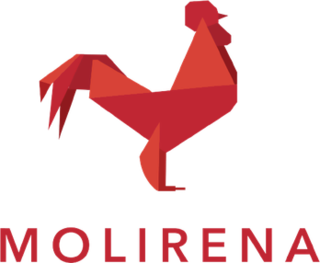
The Democratic Solidarity Party was a political liberal party in Cuba. Although changes to the Cuban constitution in 1992 decriminalized the right to form political parties other than the Communist Party of Cuba, these parties are not permitted to campaign or engage in any public political activities on the island. The Democratic Solidarity party described itself as "an organization from within Cuba promoting democracy and the respect for human rights by the peaceful route." The last President of the party was Fernando Sánchez López. The party was a full member of Liberal International.
The Liberal Party of Cuba, was one of the major political parties in Cuba from 1910 until the Cuban Revolution in the late 1950s, when it was exiled.
This article gives information on liberalism worldwide. It is an overview of parties that adhere to some form of liberalism and is therefore a list of liberal parties around the world.

Majorcan Union was a regional liberal party on the island of Majorca, Spain. It was founded in October 1982, as a nationalist continuation of the then disintegrating Union of the Democratic Centre (UCD). The main founder was Jeroni Albertí Picornell.
This article gives an overview of liberal parties in Bolivia. It is limited to liberal parties with substantial support, mainly proved by having had a representation in parliament. The sign ⇒ means a reference to another party in that scheme. For inclusion in this scheme it isn't necessary so that parties labeled themselves as a liberal party.
This article gives an overview of liberal and radical parties in Chile. It is limited to liberal and radical parties with substantial support, mainly proved by having had a representation in parliament. The sign ⇒ means a reference to another party in that scheme. For inclusion in this scheme, parties do not necessarily need to have labeled themselves as a liberal party.
This article gives an overview of liberalism in Cuba. It is limited to liberal parties with substantial support, mainly proved by having had a representation in parliament. The sign ⇒ means a reference to another party in that scheme. For inclusion in this scheme it isn't necessary so that parties labeled themselves as a liberal party.
This article gives an overview of political liberalism and radicalism in Ecuador. It is limited to liberal and radical parties with substantial support, mainly proven by having had representation in parliament. The sign ⇒ means a reference to another party in that scheme.
This article gives an overview of liberalism in Colombia. It is limited to liberal parties with substantial support, mainly proved by having had a representation in parliament. The sign ⇒ means a reference to another party in that scheme. For inclusion in this scheme it is not necessary for the parties to have labeled themselves as a liberal party.
Since the beginning of liberalism in Portugal in the 19th century, several parties have, by gaining representation in parliament, continued the liberal ideology in contemporary Portuguese politics. But after the initial fervor of the Liberal Revolution of 1820 and the outcome of the Liberal Wars (1828–1834) during the 19th century, liberalism was relegated to a secondary role in Portuguese politics and government and even outlawed for periods of time. The first fully-fledged liberal party founded as such to have a seat in the Portuguese Parliament since the end of the First Portuguese Republic (1910–1926), was the Liberal Initiative, in 2019.
This article gives an overview of liberalism and radicalism in Spain. It is limited to liberal and radical parties with substantial support, mainly proved by having been represented in parliament. The sign ⇒ denotes another party in that scheme. For inclusion in this scheme it is not necessary that parties label themselves as a liberal or radical party.

The Nationalist Republican Liberal Movement is a centre-right conservative-liberal political party in Panama.
This article gives an overview of liberal parties in Brazil. It is limited to liberal parties with substantial support, mainly demonstrated by having had representation in parliament. The sign ⇒ indicates a reference to another party in that scheme. For inclusion in this scheme, it isn't necessary so that parties labeled themselves as a liberal party.
This article gives an overview of liberalism in Panama. It is limited to liberal parties with substantial support, mainly proved by having had a representation in parliament. The sign ⇒ means a reference to another party in that scheme. For inclusion in this scheme it is not necessary that parties labeled themselves as a liberal party.
Liberalism in Uruguay organized itself in the nineteenth century in the Colorado Party, nowadays an heterogeneous party, divided in factions ranging from Moderate to social democracy. Its general profile is more or less liberal. They can differ very much in political profile. Liberal forces are not only active in the Colorado Party and this party has also moderate factions.
This article gives an overview of liberalism and radicalism in Paraguay. It is limited to liberal and radical parties with substantial support, mainly proved by having had a representation in parliament. The sign ⇒ means a reference to another party in that scheme. For inclusion in this scheme it isn't necessary so that parties labeled themselves as a liberal party.
This article gives an overview of liberalism in Nicaragua. It is limited to liberal parties with substantial support, mainly proved by having had a representation in parliament. For inclusion in this scheme it is not necessary so that parties labeled themselves as a liberal party.
The Solidarity Party was a political party in Panama that merged with the National Liberal Party and formed the new Patriotic Union Party.
The Patriotic Union was a political party in Panama. The party's president was Guillermo Ford.
Vente Venezuela is a political movement in Venezuela headquartered in the city of Caracas. It has parliamentary representation in the National Assembly. Its registration as a political party has not been granted by the National Electoral Council.



